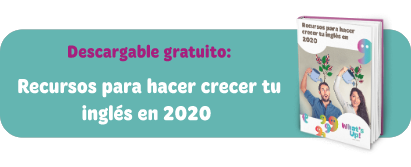What's Up! blog
el mejor contenido del mejor curso de inglés
Practica inglés con estos ejercicios de verbos modales
Como ya hicimos con las preposiciones, en este artículo vamos a hacer unos ejercicios para repasar algunos verbos modales, atendiendo a las dificultades que pueden surgir a la hora de usarlos. Encontraréis las soluciones al final del post, ¡No vale copiarse!
1. Can, could o be able to: habilidad
Aunque expresen lo mismo (habilidad) y parezcan simples no siempre son completamente intercambiables, ¿eres capaz de diferenciarlos bien?
- Photographic or video cameras are not allowed inside the museum. Cameras can/ are able to be left in the lockers.
- Luckily we could/were able to finish the works in the garden before it was too cold.
- The NGO could/was able to draw on the support of 200 volunteers to deliver all the donations.
Could you/ were you able to understand the end of the movie? I thinks it’s totally meaningless. -
I have booked the tennis court, but I have no partner… – Sorry, I can’t/ I’m not able to play tennis.
-
Look at me, I can/ I’m able to ride my bike with my hands off the handles!
-
I know you have been smoking, I could/was able to smell the cigarettes when I came into the room
-
The air is so polluted in Pekin, I could hardly/ was hardly able to breathe.
-
Can you/are you able to read without your glasses?
-
He could/was able to reach the finish line after the three hour marathon.
2. May y might: posibilidad
Al igual que con los anteriores, may y might tienen el mismo significado, pero no siempre se pueden intercambiar libremente. veámoslo con unos ejercicios.
a. Completa los huecos con may o might. Si ninguno de los dos es adecuado, usa otra solución que sirva. May the force be with you!
-
We _______ go to New York for our winter holidays
-
Venus ______be seen clearly in the night during this month
-
I feel so tired today. I think I _________have a bath and relax.
-
Someone has forgotten to pay. _________ it be you?
b. Completa estas oraciones con may o might y pon el verbo en paréntesis en su forma correspondiente
-
There’s a man lying on the pavement. Do you think he __________________________ himself?(hurt)
-
Hurry up! the visitor ___________________________ already (wait)
-
Ann looks exhausted, she__________________________________________ before she came here. (run)
-
Tom told me he was going to the hairdresser today. He ___________________________ your advice seriously your advice to dye his hair. (take)
¿Qué tal te ha ido? Si crees que te cuesta recordar la gramática, también te puede interesar echar un vistazo a este artículo, en el cual te explicamos cómo hacer para aprenderla.
Soluciones:
1. can, were able to, both, could, can’t, can, could, could, both, was able to.
2.a. might, may, might, could.
2.b. may/might have hurt, might be sent/might have been sent, may/might have been running, might have taken.
Post relacionados:
- Los 10 phrasal verbs con “look” más útiles y cómo usarlos
- Ejercicios prácticos de inglés para aprender la pasiva
- ¡Enlaza tus ideas! 7 conectores en inglés para escribir mucho mejor



